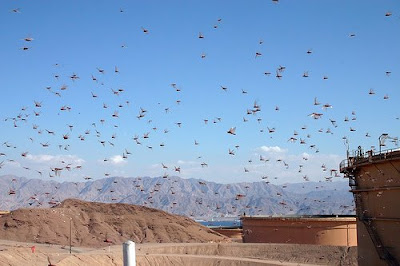
Original article:
- Anstey, M.L., Rogers, S.M., Ott, S.R., Burrows, M., & Simpson, S.J. (30 January 2009). Serotonin mediates behavioral gregarization underlying swarm formation in desert locusts. Science 323 (5914): 627-630. [DOI: 10.1126/science.1165939]
- Includes links to a longer commentary (Perspectives) and shorter commentary (ScienceNow), an author interview podcast and podcast transcript
- Green Muscle, a fungal biopesticide for control of grasshoppers and locusts in Africa - chapter in "Biological control: a global perspective"
- Locust: the devastating rise and mysterious disappearance of the insect that shaped the American frontier
- Locusts - chapter in "Agrometeorology related to extreme events"
- Serotonin system- chapter in "The neuromodulators"
- Biology of aggression - serotonin addressed throughout















